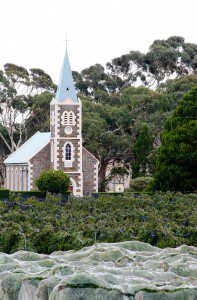The colonial government offered these Lutheran immigrants good farmland along the Murray River in South Australia, in the country surrounding Adelaide, including the Barossa Valley. These farmers soon realized that the soil and climate were just right for growing grapes. Thus began the Australian wine industry.
Others too began making wine, and today big corporations are sending rivers of Australian wine throughout the world. But the best wines are made by small, family-run wineries, many of which are still made by Lutherans who go to churches that are sometimes built right next to the vineyards. (As in this photo of Zion Lutheran Church next to the Hill of Grace vineyards.) There are some 50 wineries in the Barossa Valley in an area of just 352 square miles, as well as some 550 vineyards that supply grapes for 170 other Australian wine companies. Nearly all of the wineries are open to visitors and offer free samples. (Check out this page on Lutheran winemakers and see some of the wines they make. This organization, started by TV wine expert Tyson Seltzer, himself an active Lutheran, supports Lutheran congregations.)
The wine culture of Australian Lutherans–evident from their church dinners, their hospitality to visitors, and the gifts they send with them–may seem odd to American Christians shaped by Pietism. But these Lutherans, in my experience, are typically devout, evangelical, and confessional.
The Lutheran Church of Australia (LCA) is small, with some 60,000 regular attendees in 648 congregations. But it has hit above its weight when it comes to theological contributions. Lutheran luminaries with LCA connections include Hermann Sasse, Norman Nagel, Kurt Marquart, and John Kleinig. LCMS president Matthew Harrison studied for a year at the seminary in Adelaide, where my son-in-law has just joined the faculty.
In 1966, the Lutherans with ties to the LCMS merged with another Lutheran body with ties to the old ALC. Today that merger is strained. Currently the LCA has fellowship with neither the LCMS nor ELCA and is a member neither of the conservative International Lutheran Council nor the liberal Lutheran World Federation, holding “associate” status in both organizations. But both sides are pulling on the small church body. The defining issue in world Lutheranism is women’s ordination: four times the LCA voted it down, the last time by only a couple of votes. (Such a change requires a 2/3 vote of its convention. Though a majority of pastors reportedly opposed women’s ordination, lay delegates outnumber pastors by two to one.) Conservatives worry what might happen next time the issue is brought up.
But I’ve been encouraged by what I’ve seen–an excellent conference on Law & Gospel put on by energetic young pastors (including Michael Lockwood), congregations that are small but well-attended, a stimulating outreach to university students, memorable conversations with pastors and theologians and laypeople. So we should pray for the LCA–that it can overcome its challenges, find unity in its confessional heritage, and grow by reaching secularized Australians with the Gospel. And we can also help them by lifting a glass of good Australian wine.
Photo: Gnadenberg Church (Zion Lutheran) and the Hill of Grace vineyards. By Stefan (Own work) [CC BY-SA 3.0 (http://creativecommons.org/licenses/by-sa/3.0)], via Wikimedia Commons
 In the late 1830s, the British colonial government of Australia had a problem. There was a continual stream of settlers–the ex-convicts who had served their time in the prison colonies–but they were nearly all from the city. What was needed for Australia to become a self-sustaining colony was farmers. Colonial officers heard of a group of skilled farmers from Germany who wanted to emigrate due to religious persecution. These were “old Lutherans” who refused to go along with the liberal theology of the state church in Prussia and other principalities. (Others went to North America where they founded the Lutheran Church Missouri Synod.)
In the late 1830s, the British colonial government of Australia had a problem. There was a continual stream of settlers–the ex-convicts who had served their time in the prison colonies–but they were nearly all from the city. What was needed for Australia to become a self-sustaining colony was farmers. Colonial officers heard of a group of skilled farmers from Germany who wanted to emigrate due to religious persecution. These were “old Lutherans” who refused to go along with the liberal theology of the state church in Prussia and other principalities. (Others went to North America where they founded the Lutheran Church Missouri Synod.)














